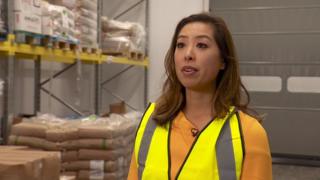Coronavirus: Three firms still positive despite the virus crisis

The scale of the UK’s economic troubles have been laid bare by the latest GDP figures.
Will the recovery be V-shaped, L-shaped, U-shaped, or is it far too early to tell?
Despite the uncertainties, however, some British companies are nothing if not positive.
Here, the owners of three firms that went into lockdown in March tell the BBC why they can see light at the end of the tunnel.
Vivien Wong, co-founder, Little Moons
The lockdown hit just as Little Moons was enjoying its best month of trading.
The business, which makes the Japanese ice cream confection mochi for restaurants and supermarkets, shut down overnight.
Co-founder Vivien Wong said lockdown didn’t come as a great surprise. «We’d followed what was happening in China and Hong Kong,» she said.
More than 50% of revenues came from restaurants, money that dried up immediately. «We were weren’t sure what was going to happen with supermarkets, but we knew immediately we had to go into cash preservation mode.»
Luckily, Little Moons struck a deal with its landlord, which eased cash flow. «We cancelled marketing and all unnecessary spending. Basically, we just hunkered down,» Ms Wong said.
The London-based company trades throughout Europe, which has helped Little Moons to get back to business.
Ms Wong said: «Europe opened up a little earlier, so from about mid-May we started getting orders from supermarkets.
«We started un-furloughing a few members of our team, and have just started cranking up production again.»
But a return to the record trading Little Moons saw in March could be a long way off. Ms Wong said: «We have halved the number of people on the production floor and changed shift patterns.
«It means we are not as efficient as before. That’s really affected us financially.» Little Moons is employing more cleaners, and the cost of face masks and other food hygiene equipment has soared.
The firm’s future is tied up with the restaurant sector, which she worries may never fully recover. That said, supermarket orders are rising, which Ms Wong puts down to people wanting comfort food.
Adam Redhouse, director, Squires Estates
«It was pretty catastrophic» is how Adam Redhouse describes the first few days of lockdown. Sales and lettings at his London estate agents firm disappeared virtually overnight.
«We furloughed sales staff immediately, and closed all the offices,» he said. «We lost over 50% of the sales pipeline over the first few days as people cancelled.»
And yet, over the following weeks the business continued to get what Mr Redhouse said were «a fair few inquiries. That was a massive surprise. But if you can’t do viewings, you can’t sell properties.»
Still, even though Squire Estates did very few transactions, the continuing customer interest at least gave him hope that business would pick up once the lockdown eased.
It was only in mid-May that estate agents began re-opening for business, but Mr Redhouse has been amazed at the pace of recovery. «It sounds crazy, given how much business we lost,» he said.
«It was on a Tuesday night that the government said we could re-open, and on the Wednesday morning we un-furloughed all the sales staff. There was a lot of pent up demand for transactions and viewings,» he said.
It helped, Mr Redhouse believes, that he and his partner made a special effort to keep in touch with clients and potential clients during the lockdown.
Business continues to pick up, but will it get back to normal? «I like to think so. The amount of demand that we are seeing shows that people want to move. I feel positive,» he said.
Sophie Lawler, chief executive, Total Fitness
Sophie Lawler’s 17 health clubs remain closed to their 100,000 members in north-east England. And like the rest of the fitness sector, she has no idea when she might get the green light to re-open.
«The whole sector has struggled financially, and may do so for years to come,» she said. «The industry is shouldering quite some rental burden, costs we still incur even while we’re closed.»
Furloughing has been vital. «It’s given us a great deal of oxygen to keep the business going,» she said.
Staff wages are the biggest fixed costs after property rents and rates.
As soon as Total Fitness is given the go-ahead to re-open Ms Lawler plans to bring all the staff back from furlough. «We will need all our people, maybe even more.»
She’d like to see the government do more to help, perhaps with some VAT exemptions and support for landlords to let them ease the burden on leaseholders.
Despite the uncertainties, however, she says the fitness industry «has an exceptionally bright future if we can weather this storm».
Ms Lawler said the sector has proved particularly resilient to recessions in the past, and will do so again. She expects to see a uptick in customers who recognise the importance of fitness and exercise in the fight to stay healthy against viruses.
«It terms of demand, we will do pretty well when we get through to the other side of this,» she said.
The trouble is, she has no idea when that might be. «Our single biggest challenge is that there is just no guidance on re-opening.»


